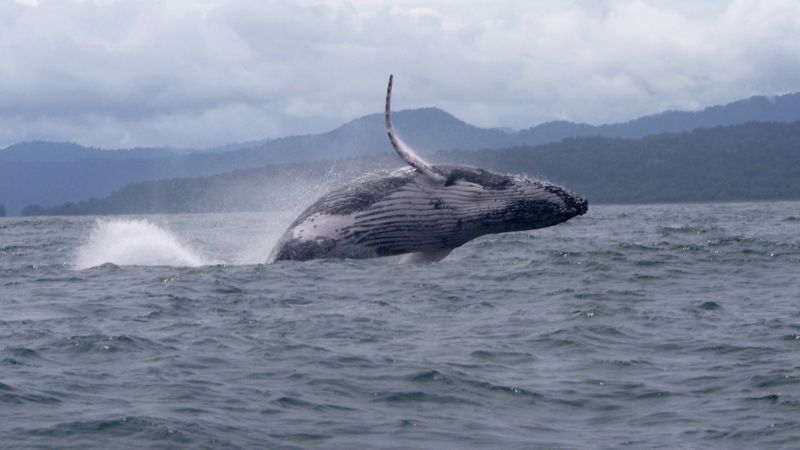In an astonishing revelation, a male humpback whale has undertaken a remarkable journey spanning an incredible 13,046 kilometers (8,106 miles) from South America to Africa. This voyage sets a new record as the longest migration recorded for a singular whale, as evidenced by a recent study published in the journal Royal Society Open Science. Notably, this journey signifies the first documented instance of an adult male humpback traversing the expanse between the Pacific and Indian oceans.
The journey of this specific humpback whale began in 2013 when he was first sighted off the coast of Colombia. Observations continued, with him being spotted again a few years later in close proximity to where he was initially found. It wasn’t until 2022 that the whale made headlines again, this time for his unexpected appearance in the Indian Ocean near Zanzibar, located off the coast of East Africa.
Humpback whales are known for their expansive migration routes, often exceeding 8,000 kilometers (4,971 miles) in a single direction. The study highlights that this particular whale’s migration nearly doubles the typical length for these marine giants. “These animals are distinct individuals, and they’ll do surprising things,” commented Ted Cheeseman, a marine biologist at Southern Cross University in Australia and coauthor of the study. Cheeseman also pointed out that the oceanic expanses are interconnected and that whales freely cross geographical boundaries during their migrations.
To track this incredible migration, researchers utilized a platform called Happy Whale, which Cheeseman helped cofound. This platform acts as a collaborative tool for citizen scientists, researchers, and whale watchers, allowing them to submit photographs of whale sightings to build a more extensive database.
Humpback whales inhabit oceans across the globe and are renowned for undertaking some of the longest migrations among mammals. However, the migration of this male whale is distinctive because of its movement between various breeding grounds. Unlike the traditional migratory habits of humpback whales—who typically return to specific breeding locations each year for mating—this whale demonstrated a new level of adaptability by traveling between different breeding stocks in separate oceans.
Ari Friedlaender, a professor of ocean sciences at the University of California, Santa Cruz, who was not part of the study, remarked on the challenge of traditional views concerning whale migration. “Our dogmatic thinking is that whales always go to the place where they came from,” he stated. “However, there has to be some movement where you get some explorers that decide, for various reasons, to follow a different path.”
The precision with which humpback whales navigate is impressive, and given that this whale is an adult, it’s unlikely he strayed from his breeding zone due to confusion. Cheeseman theorizes that social or environmental factors might have initiated this unusual migration. For instance, he suggests that competition among males in Colombia for mates could have motivated him to seek a less aggressive atmosphere. Furthermore, potential food shortages in the region could also have influenced his decision to migrate.
The unique aspect of whale identification comes into play with these creatures having individual identifiers visible on the underside of their tails. Cheeseman noted, “When whales dive, they lift their tails, and anyone taking a picture of their tail can record the identity of the animal.” This identification method has been established since the 1970s but has been enhanced by the Happy Whale platform, facilitating international cooperation in whale research.
As the database at Happy Whale currently encompasses around 109,000 individual whales, tracking movements becomes increasingly feasible. However, until this whale is spotted again, its precise location remains uncertain. Nevertheless, the platform allows for continuous tracking, which can unveil insights into both current and evolving migratory patterns.
The concerning reality of humpback whales lies in the devastating effects of whaling during the 20th century, which drastically diminished their population in the Indian Ocean by 95% to 99%, leaving limited information on their behavior and lifestyle. Cheeseman analogizes studying the current whale population akin to observing a kindergarten classroom—a scenario where only a single adult and a myriad of young whales dominate.
These dynamics reflect how the dominance of young humpbacks signals an essential cultural shift in whale populations within the Indian Ocean. The uncertainty tied to the acceptance of migratory whales, like the one in question, also escalates: when such whales enter new breeding grounds, their chances of integration heavily depend on their ‘foreigner’ status.
Cheeseman foresees that if exceptions to standard migratory patterns continue to emerge, these whales may begin to assimilate behaviors from neighboring populations. The interconnections that develop through such migrations can intertwine populations that previously seemed isolated, fostering a global whale community that shares information and genetic diversity, as suggested by Friedlaender. Overall, the discovery not only expands our understanding of humpback whale migration but also showcases their remarkable adaptability and the intricate social dynamics at play in oceanic habitats.



